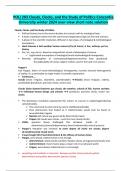Exam (elaborations)
POLI 203 Clouds, Clocks, and the Study of Politics Concordia University winter 2024 over-view short note solution
- Course
- POLI 203
- Institution
- Concordia University ( )
POLI 203 Clouds, Clocks, and the Study of Politics Concordia University winter 2024 over-view short note solution
[Show more]



